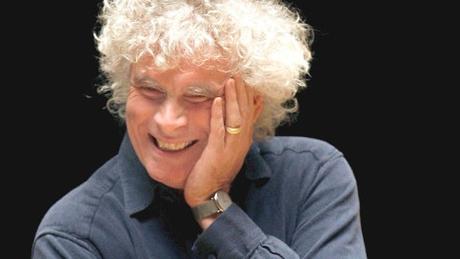by Paul J. Pelkonen

"Ein gold'ner Ring ragt dir am Finger...."
Photo © 2015 Bildquelle/Picture Alliance DPA courtesy Bavarian Radio Symphony Orchestra.
This is the same ensemble that recorded the splendid and underrated EMI cycle with Bernard Haitink in the 1980s. Their lush sound and resonant brass make them the apex of Munich's many fine professional orchestras. Here, the Bavarians take a lean and mean approach to this music, playing with great beauty and clarity of tone. Every detail, including the rising woodwinds in the prelude that are missed by most conductors, is brought to the fore, the whole creating a pointillist picture made from many individual elements. Credit for this goes to the conductor but also to the excellent engineering team.
Sir Simon takes a brisk approach to the score, making pages of often ponderous dialog fly by. And yet he does know where to slow down. Witness his approach to the two appearances of Alberich's tribe of Nibelung slaves. The first is fast, brisk as the terrified dwarfs muster themselves before their all-powerful boss. The second is slower, almost reluctant, with the music slowed to a crawl. This captures not only the reluctance of the laborers but Alberich's own fears, that he is about to lose all of his power. Another shattering moment is the murder of Fasolt by Fafner, with pounding timpani, a rolling growl of the curse motif from the low brass and the orchestra afterwards nervous and skipping, as if to move quickly past the only death in this opera.
As Alberich, baritone Tomasz Konieczny is harsh in tone at time but characterful, painting a nuanced portrait of venal lust turned to grand villainy. Little pauses, accents, and a terrifying laugh add to the dwarf's stature. His opposite number is bass-baritone Michael Volle, playing a Wotan who is, at this early stage in the Ring, already world-weary. Mr. Volle is an intelligent and nuanced singer, who knows that Wotan's tonal inflection should change (and become more like Alberich's) in the scenes when the king of the Gods seizes the Ring. (The voice doesn't switch back to sweeter tones until Wotan finally gives the bauble up.)
Rheingold has no arias, with the exception (possibly) of Loge's long narrative in scene two. This scene, where the fire god explains the importance of love and re-tells the story of Alberich capturing the titular gold, can often drag. In Sir Simon's hands, the music moves nimbly, capering like a flickering flame. There are two ways to sing this part: croon the lines as sweetly as possible or cackle like a madman. Burkhard Ulrich falls in between, adding plenty of vocal color when needed but never sacrificing the musical line for dramatic effect.
With all the muscling about between gods, dwarves and giants, one sometimes misses the important female parts in this opera. Elisabeth Kulman is a characterful Fricka, loving her man despite his flaws and the demands he puts on her patience. Freia (Annette Dasch) sounds suitably panicked in her scenes, with a potent upper range that indicates better and bigger things to come from this singer. (Speaking of bigger things, the Giants, impressively sung by the veteran pair of Peter Rose and Erik Halfvarson.) The best singing here is Janina Baechle as Erda, arcing out long contralto lines that are mysterious enough to send Mr. Volle's Wotan into a near panic as the trance of the Ring finally snaps. (This is the moment of "switch" mentioned above.)
The remaining gods are Benjamin Bruh, who sings Froh with a fine, light tenor that indicates that he is probably not a Siegfried-in-training. His counterpart is the impressive Christian van Horn, a full bass with a big future. He is brutish in the first part of the opera, but achieves an eloquence of line in his cries of "He da! He da, He do!" (It's nice to hear these lines sung where many other singers opt to shout over the orchestra.) The sound of this recording is full and spacious, made in the Herkulesaal in Munich in front of a very quiet live audience. May this Rheingold prove to be the start of something even bigger. As Sir Simon just conducted Die Walküre with the same orchestra this month, it looks like it very well might be.
If you enjoyed this article, it's time to click over to Superconductor's Patreon page, and help support the cost of independent music journalism in New York City at the low cost of just $5/month.

